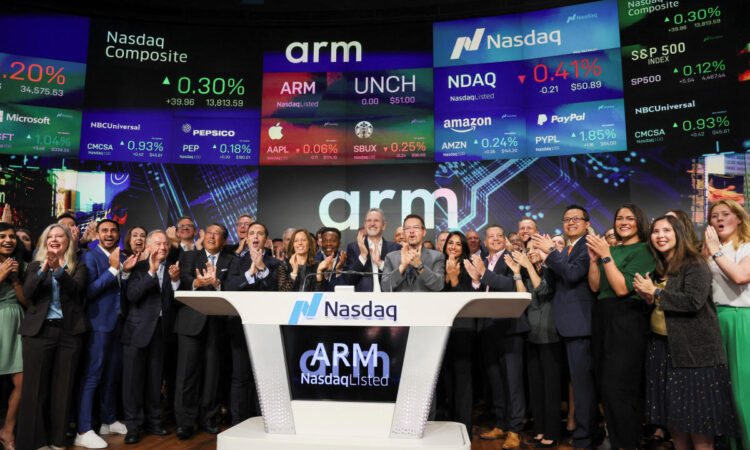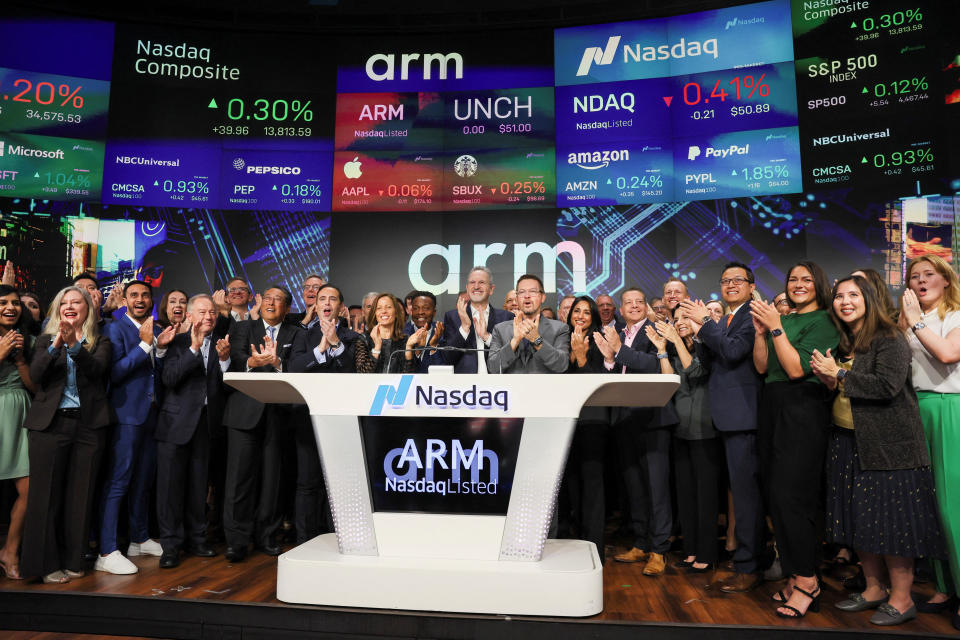

Those keen to buy shares in Arm Holdings (ARM) might be wondering why it has not yet been possible to purchase them in a ‘stocks and shares ISA account’, which normally allows such transactions, and also enables investments in a wide range of funds, trusts and bonds.
Well, the delay is down to a technical listing problem, which Hargreaves Lansdown explained.
“Our understanding is that Arm cannot be traded in an ISA. Arm is trading as an American Depository Share (ADS) which means that the actual shares are held in trust and the securities are simply representative. As a result, ADS can’t be held within an ISA wrapper.”
Analysts at AJ Bell also highlighted how wording provided by The Investing and Saving Alliance (TISA) suggests that the ADSs are not ISA qualifying.
A source close to the ISA industry told Yahoo Finance UK the following in response: “It is a scenario that we see quite frequently, where shares are issued on the New York Stock Exchange (NYSE) via an American Depository Share mechanism (ADS).
“The strict reading of the ISA regulations means that the ADS doesn’t qualify to be held in a stocks & shares ISA, because the underlying shares themselves are not individually listed. It’s one of those scenarios where, logically, we can’t really see an obvious reason as to why the ADS shouldn’t be ISA qualifying, but that is how the ISA regulations are currently worded, which we have corroborated with HMRC several years ago.”
It is not known when they might be available, if at all, in a stocks and shares ISA account.
Why the fuss over Arm shares?
The British chip designer drew big investor interest after it signed up 28 banks, including Barclays (BARC.L), Goldman Sachs (GS), JPMorgan Chase & Co (JPM) and Mizuho Financial Group (MFG), for its blockbuster IPO on the Nasdaq (^IXIC) on 14 September under the symbol “ARM.”
Shares in the company surged on its opening day on the Nasdaq after Japanese group SoftBank (9984.T), which owns Arm, offered 9.4% of the company’s stock on the public market but still retained 90% after the IPO.
Read more: Trending tickers: Boohoo l Greggs l Tesla l Nvidia
Arm shares were priced at $51 before trading began, the top end of a range starting at $47, giving the company a market valuation of $52.3bn (£43.3bn).
It was expected that the IPO would raise about $4.9bn for SoftBank, which paid $32bn to acquire Arm in 2016.
The Arm IPO created waves because the company designs much sought after microchips, which it then licences out to other companies.
Televisions, smartphones, drones, smart homes, smart cars, wearable tech, and electronic passports all use its technology. Given the ongoing global microchip shortage, Arm’s strategic importance has become more significant than ever.
Read more: Greggs announces brand new menu items and 145 shops
“The company has exhibited robust financial performance, and its strategic advantages are manifold. These include a wide range of applications for its technology, a deep intellectual property moat, and established partnerships with key industry players,” Matt Oguz, founding partner at San Francisco-based Venture Science, said.
“Its substantial contributions to the ecosystem of connected devices make Arm an attractive proposition for investors looking to capitalise on the continued growth of IoT, AI, and edge computing.”
The IPOs of 2023 and beyond
Arm’s IPO caused some market excitement with its recent listing and Instacart and Klaviyo have since followed suit.
Strong debuts could be enough to thaw some of the IPO freeze seen in the last 18 months. Year-to-date, there have been 84 traditional IPOs, that’s according to Dealogic. In 2021, however, global markets delivered 2,682 IPOs raising $608bn (£500.54bn), including 459 IPOs in EMEA, raising $99bn.
The largest IPO globally in 2021 was the $13.7bn IPO of Rivian Automotive (RIVN) on the Nasdaq, an US electric vehicle automaker, which attracted significant investor attention.
This year, however, ARM, Instacart (CART), Klaviyo (KVYO) and upcoming Birkenstock (BIRK) are among the big IPOs of 2023 so far.
Watch: Nvidia & Apple: What the charts show about the tech giants
Download the Yahoo Finance app, available for Apple and Android.






